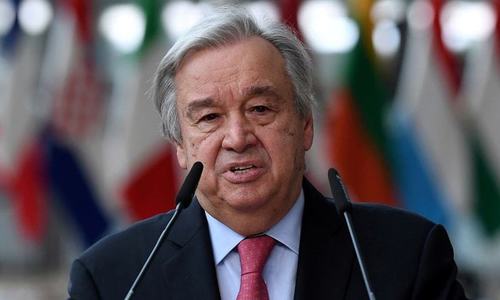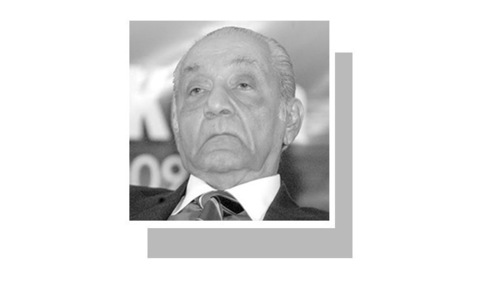Federal Minister for Planning, Development and Special Initiatives Asad Umar on Wednesday said that a basic democratic "skeleton" existed in the country and its principles were being fulfilled through political parties, elections and voting.
Addressing a ceremony in Islamabad on the occasion of International Democracy Day, Umar said that Pakistan saw its first peaceful transfer of power from one civilian government to another in 2013. He added that the current 13-year period was the "longest continuous period" of the country's history in which the democratic process had worked.
"So the basic principles of a democratic skeleton are being fulfilled and there are political parties, elections happen, representatives come after voting and sit in assemblies and pass bills, the courts make independent decisions, the media does open criticism and the government is there as well that tries to work for the nation," the planning minister said.
He said if anyone were to fairly analyse the question of whether democracy had been strengthened in the country, they would agree that it had seen improvement and become stronger, with room for further progress.
"Remember this is that country in whose first 65 years there was not one peaceful transfer of power from one civilian government to another."
Meanwhile, in other countries, he said, democracy was being challenged and extremism and intolerance were on the rise with "unthinkable scenes" being seen in established democracies, referring to the assault on the US Capitol in January by disgruntled supporters of former US President Donald Trump.
"So Pakistan, where it's only been 13 years of a continuous process, there is a lot of room for improvement," he said. The planning minister highlighted what he considered to be the "main pillars" of democracy and outlined where he felt corrections were needed.
Regarding politicians, he said they would only be considered democratic representatives when they are "truly answerable to the people". He said elected representatives would have to answer in the courts if they violated any law and stressed the need for an effective accountability system.
Judicial independence
Similarly, he said, "Democracy is not complete without an independent judiciary", adding that the courts should be free of government influence but are not above the law.
He said that it must not happen that when judges of higher courts are asked about their assets, they respond with allegations of attacks on judicial independence. "You will have to answer and you are not above the law," Umar said.
He stressed that a balance was needed where courts had the final right to interpret the law and serve as a check and balance on the government but were in turn also checked by the law.
Role of parliament
Regarding the legislative assemblies, he said the opposition had a job to criticise, monitor and question the government but using it only to promote personal interests was undemocratic. "It is our collective responsibility because we are citizens first and then politicians, that the parliament's priorities are the nation and not personal interest," the minister said.
He also said there was a need to improve and invest in standing committees to equip them with the capability to keep a check and balance on the government and review alternative policies.
Free media
The federal minister also highlighted journalism as one of the key pillars and said a democratic society and system could not be formed or run until journalists were independent.
"Fawad Chaudhry is my friend but he or any information minister should not have the right to stop any journalist from speaking the truth. If they have this power, then democracy will be weakened."
He added, however, that the information minister also had the responsibility to protect citizens from fake news which counted as defending democracy. Umar called upon the media to move beyond "self-regulation", saying that the decision to remove regulators from other sectors and leaving them to self-regulate would not be received warmly by the media itself.
"If something (self-regulation) isn't good for someone else then how can it be good for the media?" he questioned. The federal minister acknowledged, however, that he agreed "100 per cent" that the government should sit down with all media stakeholders and listen to their stance to bring about a system that encouraged "good journalism".
Lastly, he said: "Tanks and planes can't defend democracy. Democracy is strengthened when the people think of themselves as a part of the system."
This is why, according to the planning minister, Prime Minister Imran Khan had emphasised upon helping the weakest segments and backward areas of the country. Recounting various development packages announced for neglected areas, he said opposition figures from Balochistan had come to him and said that the development package for the province was much more than their expectation.
"This is Imran Khan's vision that when you make every Pakistani a participant [in progress] and everyone gets justice, then Pakistan and democracy will be strengthened."
'Information is bolstered by democracy'
Meanwhile, Information Minister Fawad Chaudhry said his sector was greatly empowered due to democracy since the two went "side-by-side".
"The more your democracy [increases], the more your information will be bolstered".
Chaudhry too outlined what he considered to be democratic pillars: rule of law, participatory government and basic human rights. "If any of these pillars is missing, then democracy is imperfect," he said.
He said Pakistan was among the "rare countries" that had come into being on the basis of a democratic process.
The information minister said the debate should move beyond whether democracy was present or not to achieving "quality democracy".
Chaudhry said there were two to three "basic problems" in Pakistan with one being politicians desiring democratic governments but undemocratic political parties. "All Pakistani political parties are standing on an undemocratic system," he said, singling out the prime minister as the only one who talked about change and wanted to make the PTI a democratic party.
"If there is anyone you can expect a good action from in Pakistan then it is Imran Khan."
The second he said was "elimination of accountability" for constitutional institutions such as the Election Commission of Pakistan or the courts.
"Some judges take satisfaction in insulting a grade-22 officer and then they tell stories about it. This is not how a democracy can work or how judicial functions in a state should be discharged," the information minister.
He added that the judiciary could not garner respect on the basis of force but only through its conduct.
Coming to the media, which was the "watchdog over all of them", Chaudhry said it wanted to regulate everyone but self-regulate itself.
"Ideally it should happen that institutions self-regulate [themselves]," he said, adding, however, that if the media was allowed to self-regulate then other sectors would have to be as well.













































